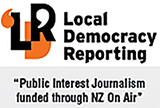Support for real-time monitoring at lakes

A plan to implement real-time water monitoring at the Ōtūwharekai (Ashburton Lakes) has received Ashburton District Council support.
The previous council voted to support Aoraki Environmental Consultancy’s application to the Ministry for the Environment for the Ōtūwharekai Mātauranga Māori Cultural Monitoring Programme.
The programme is an information gathering project, and the results will be available to all members of the Ōtūwharekai working and steering groups.
The ongoing environmental issues and degradation of the Ōtūwharekai area is well documented, with the council recently introducing a 30-year-plan for Lakes Camp and Clearwater aimed at reversing the environmental decline.
The monitoring programme will see five sensors installed in the area that will feed real time water quality data which can be used to develop solutions.
Strategy and policy manager, Toni Durham, said it’s an exciting project.
“That real-time monitoring is exceptional to have in the area, and we’ll all benefit from it,” Durham said.
Departing councillor Stuart Wilson was right behind the project, as it will “provide a true picture of what’s happening to all the lakes up there”.
The councillors were asked to offer council’s support to the funding application, which they did unanimously, but there were some concerns raised over some phrasing in the report.
It stated that Te Rūnaka o Arowhenua, via Aoraki Environmental Consultancy, have been working with the Ministry for the Environment on a project in the Ōtūwharekai area to build capacity and capability for Māori to participate in and make decisions for freshwater management in the area.
The “make decisions” was queried by several councillors, including Lynette Lovett.
“Is it joint decisions or is it Maori making the decision up there? It should have been better worded, to me, it’s a joint decision between all the groups, but looking at that it’s them making the decision,” Lynette Lovett said.
Durham explained the statement had been “picked up directly from what had been provided to us by AEC”.
While the councillors queried the phrasing, none were as forthcoming to suggest it was a form of introducing co-governance.
Chief executive Hamish Riach said the councillors were only being asked to support the funding application, and the wording in the report was not contributing to any decision or setting any precedent.
- By Jonathan Leask

